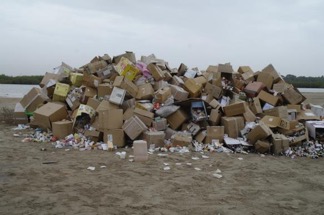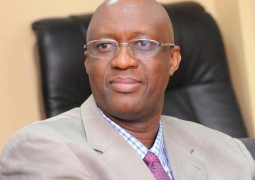
The disposal exercise held at Old Cape Road in Bakau was in line with the agency’s regulatory functions to ensure public health safety.
The Medicines and Related Products Act 2014 established the MCA with the mandate to regulate and control the manufacture, importation, exportation and distribution and control of advertisement and promotion of medicines and its related products with respect to ensure their quality, safety and efficacy.
The medical drugs burnt was part of a large quantity of sub-standard and falsified medicines seized during series of nationwide operations, targeting illegally imported medical products and those found in illegal premises.
At the event, Dr Mustapha Bittaye, director of Health Services at the Ministry, while thanking stakeholders for their efforts in ensuring public safety, acknowledged that the exercise is one of the mandates of the Ministry.
“We therefore appreciate the good work of our international partners and stakeholders, who are working to make sure we are all safe. What we want is to make sure every drug coming to the Gambia is safe,” he said.
Dr Bittaye informed that the journey will not be easy task as there will be obstacles along the way, further assuring that this was just the beginning.
He thanked MCA and its team for their proactive efforts, which he added, has led to some being made enemies in the line of their work.
For his part, Dr Selassi D’ Almeida, representing World Health Organisation, expressed gratitude on behalf of WHO to be part of the event, reminding that the Government of The Gambia signed a commitment to provide Universal Health Coverage for all the people living in the country by 2030.
“We cannot provide Universal Health Coverage without the availability of quality medicines. Even a single dose of sub-standard or falsified medicine means that the system is being contaminated.”
The WHO official expressed gratitude to MCA and its related partners, saying they were at the occasion to note and experience the exercise.
The exercise, he says, sends a clear signal to the public that falsified and sub-standards are not tolerated in the country.
That, he adds, is a clear signal that all fraudsters involved in the nefarious act should take note, further assuring of WHO’s continued support to the Ministry in ensuring that the public is safe at all times.
Tijan Jallow, Director of Operation at the Medicines Control Agency (MCA), highlighted the main mandate of the agency.
He said that medicines are not any ordinary article of commerce, adding that in most instances, consumers are not in a position to make decisions about when to use medicines, which medicines to use, how to use them and weigh potential benefits against risks as no medicine is completely safe.
Jallow also informed that expired and poor-quality medicines can result in therapeutic failure, resistance to medicines and sometimes death.
To that end, he maintained that the fight against substandard and falsified medicines is everyone’s business, further acknowledging the collaboration of MCA and stakeholders in ensuring that every medicine coming in to the country is of high quality, safe and efficacious.
The speakers included Jerreh Sanyang, board chair of the Medicines Control Agency.
Read Other Articles In Headlines




